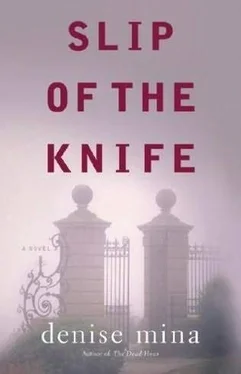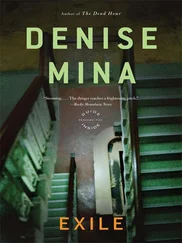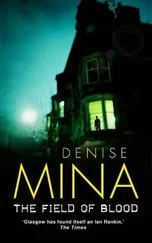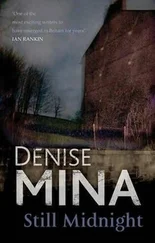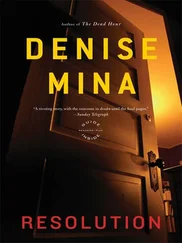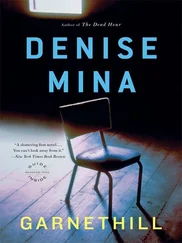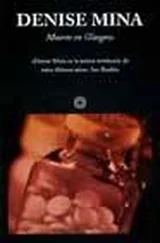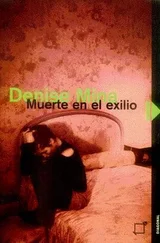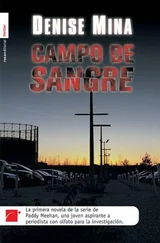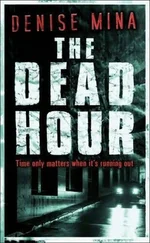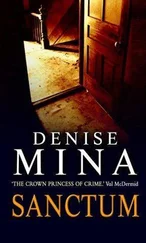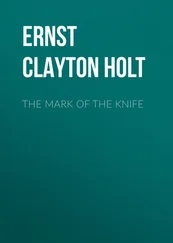“Is that a walkie-talkie?” asked Farquarson.
Damage held it up. “Portable telephone.”
McVie looked sullen. “Not that portable, though, is it?”
“Can you only phone other portable telephones with it?” asked Paddy.
Damage laughed at her. “No. You can telephone any other phone. Soon they’ll have faxes on them as well. That’s the new thing.”
“And you’ll have to lug tons of paper around,” said McVie, jealous and not making a good job of hiding it.
Paddy reached out. “Can I have a go? I need to make a two-minute call.”
“Be my guest.”
“Fucking hurry up,” said McVie.
Paddy dialed Burns’s number.
“Hello?” Burns sounded a long way away. The line crackled and spat.
“Oh, hi, George.” She was shouting, her voice lost in the big open space, so she turned away from the crowd of people and shouted into the street. “Just wondered if Pete got away to school OK?”
Burns was quiet.
A fist tightened around Paddy’s heart. “What?”
“Paddy, Pete-”
“What? Is he ill? Is he there?”
“He’s here, he’s fine but the house is full of policemen. We got broken into last night. Sandra went to the loo at three in the morning and found a guy on the landing heading into Pete’s bedroom with a knife.”
“Fuck!”
“Wearing a balaclava. He cut Sandra’s tit open and ran away but he was definitely headed for Pete.”
“I’m coming now.”
“No, look, the house is full of CID and they’re taking us to the station so they can tape our interviews. Come later. Come and get us at Pitt Street.”
“How’s Pete?”
“I’ll put him on.” Burns opened a door and called Pete.
Her son’s tinny voice came on, distorted, sounding far away and electronic. “Mum? We got burgled! A man came in in the night and tried to steal Sandra’s jewelry.”
Paddy fought back choking tears, kicking at the ground, nodding. “Gosh. That’s mad. Are you OK?”
“It’s exciting. He broke a window and climbed in.”
“I need that back now.” Damage was standing next to her, holding his hand out to the phone, deliberately ignoring the tears in her eyes and her evident panic.
“Son, Dad’s going to take you to the police station, won’t that be something?”
“I can see where he used to work. He knows everybody .”
“Come on,” shouted McVie, waving her over.
Damage had circled her and was in her face. “The battery’ll run out. Give it to me.”
“I’ll come and see you this afternoon, darlin’, OK?”
“Mum, a man said he’s going to show me the cells .”
“Meehan, give it.” Damage lunged forward to grab the phone but she clung on.
“I love you, son.”
But Pete had hung up.
Damage was saying something about the battery life. McVie came over and took her elbow, dragging her towards the church.
McBree had come for Pete, with a knife. She felt very cold, her breathing deepened, every muscle in her body was loading itself with oxygen, ready to coil and spring. She felt as if she could outstare the sun.
McVie dragged her into the cathedral. The internal walls were as black and forbidding as the façade of the church but it opened up to an arched oak ceiling and tall needled windows, jeweled with blue and red glass. McVie had gone to a lot of trouble. Big bouquets of lilies and white chrysanthemums, strung with red and blue ribbons, were hanging on both sides of the aisle with a giant wreath in white, red and blue sitting at the base of the altar. They were the colors of Ayr United, Terry’s football team.
Feeling nothing but cold, blind anger, Paddy followed McVie into the front pew. Ben, his precious, queeny boyfriend, was waiting for them. McVie would never admit to Ben, but here he was in plain sight, standing at the front of the massed mob of the Glasgow journalistic mafia. In a show of support, Paddy leaned over and kissed Ben’s proffered cheek, settling back in the pew and realizing that her lips were coated in face powder.
A minister came in and everyone stood up. The organ struck up a short tune, drowning out the sound of the singing, which was very ragged and rambling. The minister talked for a bit about life and death and why it was a shame, but not really, because of Jesus, and then, without warning, he stepped aside and looked at McVie, who looked at Paddy. Ben looked at Paddy. Everyone in the church looked at Paddy.
She wanted to drop her head back and scream but instead stepped out into the aisle, began to genuflect and then remembered it was a Protestant cathedral, getting a laugh when she bolted upright again.
She didn’t even know where to stand, but the minister held his hand out and guided her up the winding staircase to the pulpit.
The wooden platform groaned beneath her feet as she looked out at the expectant faces. Shug Grant, Keck, JT, Merki, McVie, a hundred and fifty men, some arseholes, some good souls, most both depending on the occasion.
She leaned into the microphone.
“Terry Hewitt was a friend of mine.” The words echoed around the hollow church.
It felt strange to say his name, to think of anything but Pete. He was safe at the moment and this was for Terry. Terry. Terry who wasn’t at all who she’d thought he was. He was an ordinary man who’d done his best with a lot of bad luck. But she’d made him into a paragon and then hated him for not living up to it. She couldn’t talk about that Terry, the real Terry, who came from a small home and belonged nowhere. She started again.
“Terry Hewitt was my hero. I was a copyboy at the Daily News and he was a junior reporter. He had a leather jacket.” That got another laugh. “He lived alone.” If anyone didn’t already know she came from a big Catholic family the aborted genuflection had told them, and they laughed at that too. “I didn’t know then why he lived alone, just that his parents had died in a car crash. He told me but you don’t really hear those things when you’re young. They died thirty yards from the house and Terry was the first on the scene. He was seventeen.” The pathos of the moment overwhelmed her. She paused, swallowing hard, getting a grip. “We spent a lot of time together when we were starting out. Well, most of you know,” she looked up again, “we went out together. But all we talked about was our work, what we wanted to do in our work, and Terry was going to change the world.”
She looked down and saw Shug Grant whispering to the man next to him. They both sniggered and avoided looking at her. A sexual slur about her, not thinking about Terry or who he was or what he meant his life to be, just there because everyone else was, and there would be drink afterwards.
“Some of us are here because we loved Terry. Some of us are here because our editors said we could get the morning off.” A nervous titter rolled around the church. They could see she was looking stern, staring down at Shug. She was famous for losing her temper and going beyond what was appropriate, and they could see that she was angry. “But I’m here because of what Terry represented to me. He worked on a bigger scale than most of us here. He went to war zones, conflict zones, did hard reporting on a world stage.”
Paddy could sense the atmosphere plummeting. She knew she should tell a funny story, make herself popular by lightening the mood, but all she could see was Terry as a young man standing at the end of his parents’ driveway, looking into the fireball engulfing their car. And Pete, asleep in a bed she had never seen, with a bad man outside the door and herself miles away.
The security forces would blanket the whole episode with rumors and drip feeds to hungry journos like Merki. McBree would come for Pete again and next time he’d hurt her son, to hurt her. The best she could do, what Terry would have done, was draw the fire to herself. She began to weep but her voice remained steady.
Читать дальше
